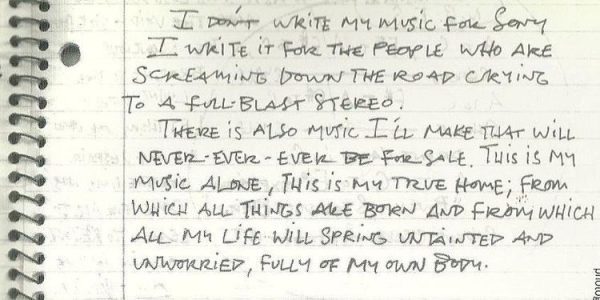Note: all quotes used in this story are from the film “It’s Never Over, Jeff Buckley.”
There’s been a sense of mystery ever since Jeff Buckley drowned in the Wolf River in 1997 at the young age of 30. Passing away to Led Zeppelin’s “Whole Lotta Love,” Jeff left us his musical legacy. It wasn’t until recently that we were given the real and raw story.
Directed by Amy Berg, the film “It’s Never Over, Jeff Buckley” was released early this August, months after premiering at the Sundance Film Festival in Park City. The film features never-before-seen archival footage, including concerts, interviews, notebooks, etc. It explores his relationships and his difficult upbringing, living under his father’s shadow. It shows his emotions and the devotion and love he had towards women and feminism. Jeff believed music was the most powerful thing in the world and that’s what he wanted to be remembered by.
It’s never over
Berg is a well-known figure in the film industry and has been trying for years to do a piece on Buckley. Beginning with the idea of a biopic, Mary Guibert, his mother, disapproved of the idea and thought it wouldn’t do justice. She felt this narrative wouldn’t capture Buckley’s essence.
After the biopic fell through, they decided a documentary would be more suitable (Berg spent over a decade working on it). Guibert was kind enough to give access to Buckley’s archives, which featured voice messages, home videos, etc. It was then titled “It’s Never Over,” after Buckley’s iconic line in “Lover You Should’ve Come Over“.
The film premiered at the 2025 Sundance Film Festival in Park City and received great success. It was followed by Ben Harper (cast member on the film) doing a rendition of “Hallelujah”, one of Buckley’s most popular covers. It was then released theatrically in the United States on Aug. 8.
Carving his journey

Many of us understand the feeling of wanting to find our own way and be recognized as an individual. Buckley felt this significantly. His father, Tim Buckley, was a well-known musician during the 60s and 70s and unintentionally cast a shadow over Jeff. Comparisons naturally arose and he despised them due to Tim’s absenteeism and his own sense of individualism. While he harbored a lot of resentment towards him, he also felt some sympathy.
“I have a great deal of pain and anger, but I have a great deal of love and compassion for Tim,” Jeff Buckley said.
He was always obsessed with music, and originally wanting to be a guitar master, he turned to songwriting.
“Music and words,” “I decided to make a woman of music, and give myself to her … and at another point, I decided to make a man of music, and give myself to him,” Jeff Buckley said.
People questioned Jeff’s ability to create his own songs because he tended to do covers. It didn’t take long for the world to see they were wrong and in the presence of a musical prodigy. This brought on the creation of “Grace.”
“Grace” is known as one of the most influential albums ever and is thought of as Jeff’s most iconic piece of work. It features songs like “Hallelujah,” “Lover You Should’ve Come Over,” etc. David Bowie later called it “the best album ever made.”
Love and connection

Throughout the film, Buckley’s relationships took center stage. A few notable ones included Rebecca Moore, a serious partner during his early years of his career, Michael Tighe, a band member and close friend, and Joan Wasser, a fellow musician and partner. Their recollections portray him as someone loyal, caring and passionate.
“Jeff had this desire to be liked and loved, and to connect with people,” Moore said.
Berg shows how these connections didn’t just affect his personal life but also his artistry. He loved women and thought their power and significance were underappreciated.
“Secretly, I wanted to be Nina Simone,” Jeff Buckley said.
The documentary shows how his emotional depth affected his performances. Whatever he was feeling, he took it on stage to make it meaningful and therapeutic for himself.
“I have been everything on stage. I’ve been wrong. I’ve been completely stupid. I’ve been stupid. I’ve been angry. I’ve been totally in love. I’ve been beautiful. I’ve been hideous. I’ve lost my pants. But I’ve never been bored. I’ve never been dead on stage. I’ve never been dead,” said Jeff.
“Grace” wasn’t just about its brilliance; it was about vulnerability. A man pouring out every fiber of his being for the sole purpose of the music. He hated the idea of traditional masculinity and did what he could to push the boundaries.
“Everybody’s sensitive, but sometimes men don’t want to recognize it,” Jeff said.
A timeless legacy

“It’s Never Over” doesn’t just record Buckley’s life – it celebrates it. The story isn’t about his musical success and brilliance, it’s about empathy, vulnerability and the courage to defy expectations. He challenged masculinity norms, loved deeply and believed music was the way of life.
“Music, it was my mother, it was my father. It was the best thing in my life,” Jeff said.
Unfortunately, passing in a mysterious and saddening way, the effect he had as an artist, friend and son will forever influence his listeners and admirers. His joy and passion for music show us time’s too short to not do what we love and be who we want to be.
This film gives life to Jeff and honors him the way he should be.
“Grace is what matters in anything.”





